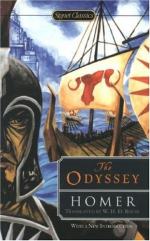On the whole, I am inclined to believe, that the labours of Peisistratus were wholly of an editorial character, although I must confess that I can lay down nothing respecting the extent of his labours. At the same time, so far from believing that the composition or primary arrangement of these poems, in their present form, was the work of Peisistratus, I am rather persuaded that the fine taste and elegant, mind of that Athenian would lead him to preserve an ancient and traditional order of the poems, rather than to patch and reconstruct them according to a fanciful hypothesis. I will not repeat the many discussions respecting whether the poems were written or not, or whether the art of writing was known in the time of their reputed author. Suffice it to say, that the more we read, the less satisfied we are upon either subject.
I cannot, however, help thinking, that the story which attributes the preservation of these poems to Lycurgus, is little else than a version of the same story as that of Peisistratus, while its historical probability must be measured by that of many others relating to the Spartan Confucius.
I will conclude this sketch of the Homeric theories with an attempt, made by an ingenious friend, to unite them into something like consistency. It is as follows:—
“No doubt the common soldiers of that age had, like the common sailors of some fifty years ago, some one qualified to ’discourse in excellent music’ among them. Many of these, like those of the negroes in the United States, were extemporaneous, and allusive to events passing around them. But what was passing around them? The grand events of a spirit-stirring war; occurrences likely to impress themselves, as the mystical legends of former times had done, upon their memory; besides which, a retentive memory was deemed a virtue of the first water, and was cultivated accordingly in those ancient times. Ballads at first, and down to the beginning of the war with Troy, were merely recitations, with an intonation. Then followed a species of recitative, probably with an intoned burden. Tune next followed, as it aided the memory considerably.
“It was at this period, about four hundred years after the war, that a poet flourished of the name of Melesigenes, or Moeonides, but most probably the former. He saw that these ballads might be made of great utility to his purpose of writing a poem on the social position of Hellas, and, as a collection, he published these lays connecting them by a tale of his own. This poem now exists, under the title of the ‘Odyssea.’ The author, however, did not affix his own name to the poem, which, in fact, was, great part of it, remodelled from the archaic dialect of Crete, in which tongue the ballads were found by him. He therefore called it the poem of Homeros, or the Collector; but this is rather a proof of his modesty and talent, than of his mere drudging arrangement of other people’s ideas; for, as Grote has finely observed, arguing for the unity of authorship, ’a great poet might have re-cast pre-existing separate songs into one comprehensive whole; but no mere arrangers or compilers would be competent to do so.’




